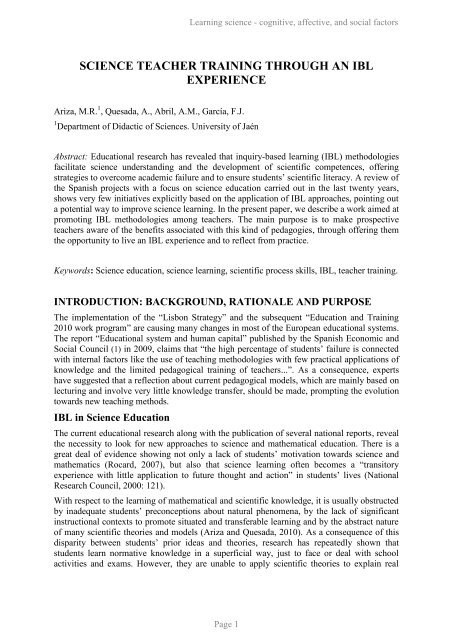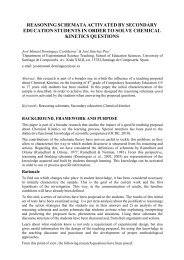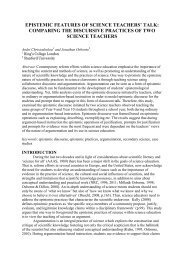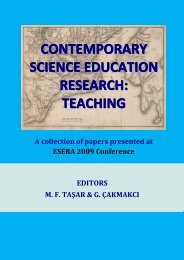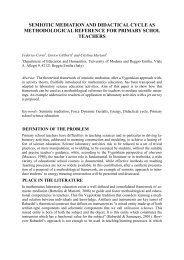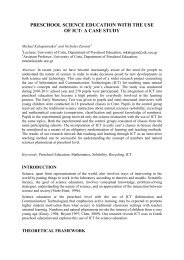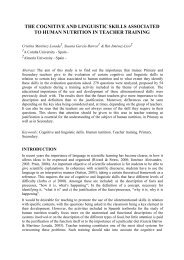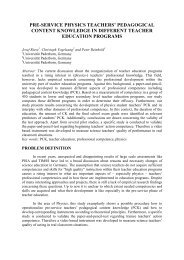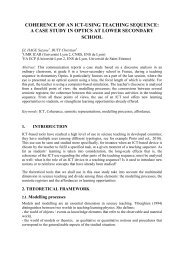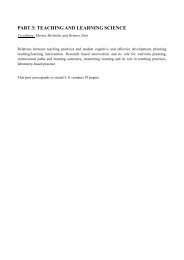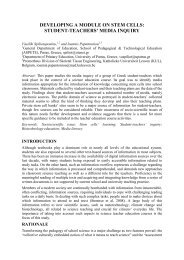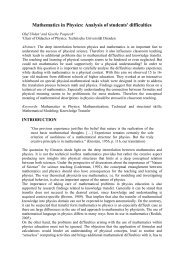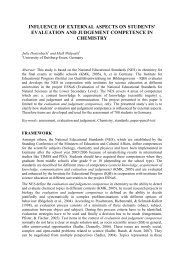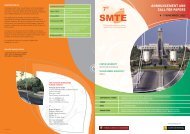Download Esera Ebook Part2
Download Esera Ebook Part2
Download Esera Ebook Part2
You also want an ePaper? Increase the reach of your titles
YUMPU automatically turns print PDFs into web optimized ePapers that Google loves.
Learning science - cognitive, affective, and social factors<br />
SCIENCE TEACHER TRAINING THROUGH AN IBL<br />
EXPERIENCE<br />
Ariza, M.R. 1 , Quesada, A., Abril, A.M., García, F.J.<br />
1 Department of Didactic of Sciences. University of Jaén<br />
Abstract: Educational research has revealed that inquiry-based learning (IBL) methodologies<br />
facilitate science understanding and the development of scientific competences, offering<br />
strategies to overcome academic failure and to ensure students’ scientific literacy. A review of<br />
the Spanish projects with a focus on science education carried out in the last twenty years,<br />
shows very few initiatives explicitly based on the application of IBL approaches, pointing out<br />
a potential way to improve science learning. In the present paper, we describe a work aimed at<br />
promoting IBL methodologies among teachers. The main purpose is to make prospective<br />
teachers aware of the benefits associated with this kind of pedagogies, through offering them<br />
the opportunity to live an IBL experience and to reflect from practice.<br />
Keywords: Science education, science learning, scientific process skills, IBL, teacher training.<br />
INTRODUCTION: BACKGROUND, RATIONALE AND PURPOSE<br />
The implementation of the “Lisbon Strategy” and the subsequent “Education and Training<br />
2010 work program” are causing many changes in most of the European educational systems.<br />
The report “Educational system and human capital” published by the Spanish Economic and<br />
Social Council (1) in 2009, claims that “the high percentage of students’ failure is connected<br />
with internal factors like the use of teaching methodologies with few practical applications of<br />
knowledge and the limited pedagogical training of teachers...”. As a consequence, experts<br />
have suggested that a reflection about current pedagogical models, which are mainly based on<br />
lecturing and involve very little knowledge transfer, should be made, prompting the evolution<br />
towards new teaching methods.<br />
IBL in Science Education<br />
The current educational research along with the publication of several national reports, reveal<br />
the necessity to look for new approaches to science and mathematical education. There is a<br />
great deal of evidence showing not only a lack of students’ motivation towards science and<br />
mathematics (Rocard , 2007), but also that science learning often becomes a “transitory<br />
experience with little application to future thought and action” in students’ lives (National<br />
Research Council, 2000: 121).<br />
With respect to the learning of mathematical and scientific knowledge, it is usually obstructed<br />
by inadequate students’ preconceptions about natural phenomena, by the lack of significant<br />
instructional contexts to promote situated and transferable learning and by the abstract nature<br />
of many scientific theories and models (Ariza and Quesada, 2010). As a consequence of this<br />
disparity between students’ prior ideas and theories, research has repeatedly shown that<br />
students learn normative knowledge in a superficial way, just to face or deal with school<br />
activities and exams. However, they are unable to apply scientific theories to explain real<br />
Page 1


